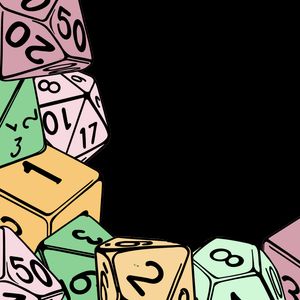May 19, 2023
Friends, I’ll be honest, I really struggled to sit down to write today. I had to water my plants, then I needed a drink, then I hadn’t taken my vitamins, then the post came through and of course I needed to pick it up right away. Little things, little things, but my scattered focus is a symptom of stress originating in bigger things.
It’s partially because I’m going back to full time work next month, which is both a “boo” and a “yey!” I’m hoping that I’ll find a balance between game design work, including this newsletter, and my new full time, income-generating responsibilities. Certainly other creators manage somehow. I’m hoping I can be one of them. Watch this space.
In the meantime this is another short edition as I have two big projects taking up my time. I’ve got a little editorialising in me this month as well, this time about the role of system mastery in game play. But first, updates.
Drama Llamas! Those of you who've been receiving my kickstarter updates know that there’s been a couple of hiccups with the art work, which is delaying the layout, which delays the release. These are on the verge of being solved, I hope, but this does mean that my schedule has gone somewhat sideways. I was hoping to be at least half way through the layout at this point. Instead I’m on hour 3 of a 7.5 hour introduction to InDesign tutorial, getting the very basics down while I wait. The tutorial is quite good, actually. That link is here, in case you are also currently stupefied by the mysteries of frames and images and text threads.
Inspirisles! By the time this newsletter goes out I will have completed my six part series of Inspirisles over on Girls Run These Worlds, sponsored by Hatchling Games. You can find those episodes on YouTube here if you’d like to watch the whole thing.
Discourse Corner: In Defence of Crunch
Complex mechanics can enhance play experiences, actually. That’s this month’s realisation from a relative newbie game designer. How have I drawn this conclusion? Well.
As you know I write games. I’m new at it but I’ve spent the last couple of years giving myself a reasonably intensive crash course. Or unreasonably intensive, if you ask my spouse (hey cutie). So as ever take everything I say with a grain of ‘yeah, but no, tho’ and a healthy spoonful of world weary patience if I happen to be re-treading ancient ground without realising. But I feel like there’s a debate which cyclically grumbles through gaming spaces like weather, comparing rules light storytelling games and crunchy traditional games, and reframing itself as a debate about creative vs. tactical, or fun and easy vs. hard and serious games to play. I have a lot of thoughts about all that, and actually wrote a bunch of them before I realised they’re not what I wanted to talk about. What I actually want to talk about is how system expertise can generate really strong immersion, and how that’s often less available in rules light games.
A lot of the joy of TTRPGs comes from playing a person who’s good at things that we aren’t, or could never be, eg. magic. Even if they’re living in a world markedly worse than our own, we escape our reality through them because they have cool skills and we get to use them to make things better, even if only for our character. In most games those skills expand or get stronger as we play, and that’s also very satisfying when you live in a world where any new skills can feel very hard to acquire. Sure, sometimes we’ll roll up a character and give them no discernible skills or redeeming personality traits, name them Bumhead and give them nought but a butter knife to defend themself, just for the novelty of seeing how long they’ll survive. But most of the stories we tell are character-driven and we want most of the characters we make have a growth trajectory. Especially if we’re looking to be immersed.
When we start playing a character they’re usually at their weakest point, then we nurture them with experiences and adventure. If the game we’re playing is new to us there’s a nice bit of immersive sympathy to be had in that they don’t know their own potential yet, and we literally don’t know the rules or remember all the things on their character sheet. As our character gains skills they don’t just get more effective through the gift of those new mechanics, but through our own increasing understanding of how to use what we have available to us. Ideally, our character reaches their full potential and we get to feel incredibly skilled and cool when we play them. A good story can make us feel that way, becoming the epic lore behind our legendary hero, but there’s nothing like those intoxicating moments when the mechanics click and you find a way to combine those character abilities with that spell or novelty magic item to magnificent effect. That’s when I feel most like I’m inhabiting my character. They’re finally demonstrating real expertise and so am I, and it feels great for both of us. Meanwhile, when she fails I really feel it because I truly know what she’s capable of if the dice are kind and - more importantly to me - I make the right choices.
I feel like this alone is a large part of the reason for D&D’s enduring popularity despite WotC’s embarrassing behaviour, the game’s cultural baggage, and its off-putting conservative sheen when compared to newer, less crunchy games. Narrative driven, rules light, egalitarian, and safety conscious - these games are far more approachable for the average player, and far quicker and less risky to produce for the average indie publisher. But with greatly reduced complexity we also reduce the potential for expertise to develop. Of course one can become an expert storyteller, but that’s a path with a much more nuanced, subtle set of milestones than the first time you understand why rogues can dash as a bonus action and put that classic action economy to good use. All too often in a rules light game we’re asked to believe that our character is great because the play book says so, and we don’t get a lot of evidence to back that up, especially if the dice are fickle.
Mechanics mastery, or min-maxing, gets bad press in those corners of the space where narrative reigns supreme, but personally I’ve never minded it in a player who still puts effort into backstory and role play. To me this isn’t just about “winning” the game. It’s about the emotional resonance of playing a character who’s really good at something and getting to feel that same way yourself. Similarly, crunch isn’t just about gate-keeping or feeling superior for knowing the player’s handbook inside out. It’s about being offered complex and meaningful choices which invest us in our character and the world, so we feel real emotions when they win and lose. Because it wasn’t just the dice that decided our plan didn’t work, or the GM adding obstacles to enhance the story - it was our choice that we made that didn’t work out as we’d hoped. Sometimes those choices are truly difficult, and all the more memorable for it.
I love the open creativity and improvisational nature of story games. I’ve run many of them and written one myself. But certainly this was something that I thought about when writing Drama Llamas, albeit in a less evolved way. In the absence of character progression in my simple, self-contained game, I wanted a route for repeat players to uncover something new each time and for savvy, observant players to have an advantage. I wanted there to be skills and moves which interact and multiply each other, and a dash of tactics to engage with on a deeper level. I’m not sure yet to what extent I’ve succeeded - I’ve been playing with a lot of first-time players in play tests - but this is surely something I’ll be taking forward into my next endeavour. How do we balance that feeling of expertise with the steep learning curve for new players? I don’t know, but I’d like to.


